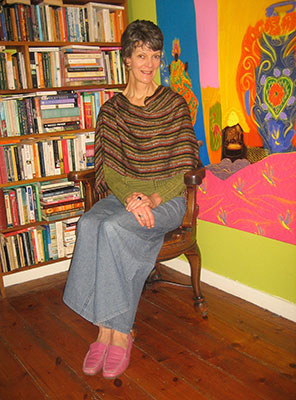
Joanne Hichens – editor of the Adults Only, the second annual Short.Sharp.Stories Awards anthology – interviews Gillian Rennie. Her story “Retrieval” was selected for inclusion in the anthology.
Gillian Rennie is now a teacher of writing and editing at Rhodes University, after decades in journalism. She believes she learns more than she teaches. As a teacher, she seeks light switches. As a writer, she turns observations into ink. As a reader, she favours the personal essay and longs for erotica that features mastectomy survivors. She holds a Mondi Magazine Award for her Fairlady profile of MaMbeki and was twice selected for the USC Annenberg/Getty Arts Journalism Fellowship. Her poems have appeared in The Sol Plaatje European Union Poetry Anthology and on SLiPnet.
Your story “Retrieval” includes an imaginary friend. Did you consciously set out to do this?
Not at the beginning, no. What I set out to do was see if I could write a 3 000-word story as the competition rules required. But next time I looked there were two characters having two pretty different lives. This was potentially disconcerting but I persuaded myself to trust that these two women knew what was what and all I needed to do was continue turning up at the keyboard until they chose to enlighten me – which I did, until they did. Early one morning they told me one of them was imaginary. Which is a Russian doll of hilarity, really, because both of them are imaginary, really, aren’t they? Only don’t tell them that, they both think they’re real. The truth can be so destabilising, whoever you are.
It’s almost as if you, the writer, were having a conversation with yourself… is there any truth to this? As you stepped from the ordinary into the fantastical?
Of course – I have conversations with myself continuously! I have no idea what other wavelength to tune into for a decent soundtrack to this documentary movie I’ve been cast in.
Tell us more about your love of cats and poetry and how the two came together in the story.
At about the same time as the Short.Sharp.Stories call for entries was announced, a writing colleague suggested I enter another competition. That one called for African poetry collections of 50 pages or more. So I started trawling my poetry folder. Took out all the poems about cats (the internet having devalued the intellectual potential of cats as poetic subjects). Took out most of the poems about sex (not wanting the rest of the continent to get the wrong idea about us down here). That left about six pages – and a clear view of my poetic concerns. Obviously there was only one thing I could do: create a new folder and write a short story to put in it.
Will readers find your story more literary than commercial?
Wow, I’d be thrilled if they did.
That sounds smug – what’s wrong with commercial success?
Nothing. But writing well means different things to different writers. I like the idea of being a tiny bit literary. And I like the idea that some readers might regard some of my work as literary.
Ooh, defensive, are we?
For sure! It’s tough enough owning up to writing erotica. It shouldn’t be tough owning up to being literary as well.
OK then, what if you had to choose between commerce and literature?
I can’t. I write what I write but what happens beyond readers’ eyes if beyond me.
There you go again, having conversations with yourself.
As a journalist writing fiction, please comment on the idea that whether one works on fiction or non-fiction it’s all about story.
Ooh, this has been such a hard one to accept. I was schooled in outdated modes of reportage that were impossible to shake off so for decades. I was wedded to veracity, and to the journalistic striving for impartiality. If I recognised the truth of fiction, I left it there to play with itself while I got on with the facts of life. It couldn’t last, of course – something had to give and it wasn’t going to be the truth so it had to be me. Eventually I got it: we are all story. We are only story. That’s the truth.
What do you think of writing competitions?
They offer multiple challenges: to write anyway (if the topic’s unappetising), to keep writing (if you win), and to write again (if you don’t).
What’s next for you?
I’m always working on the current writing prompt from my weekly writing group and I’m always working on helping journalism students tell stories better. I’m also trying to dance more and care less.
…A perfect ending for the interview, thanks, Gillian.
Article by : Stuart
Article Source : Books live
